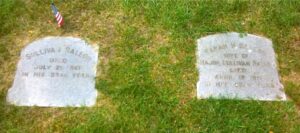This Union Officer’s letter that hasn’t been forgotten.
I’m not the biggest consumer of romantic content, fiction or otherwise.
I do have some tolerance for the genre and can be a good sport when I need to be. But my appetite for Nicolas Sparks-Esque, “I want all of you, forever, every day. You and me… every day.” (The Notebook) has its limits.
That said, there is one real-life letter that staggered me. I read it years ago and was left in awe of its eloquence. My hope is that some of you find it as moving as I did.
Before I show it to you, it’s very important that you briefly understand the context. It lends it more power.
The Civil War was in full swing. Sullivan Ballou was a 32-year-old Union Officer, who had formerly been a lawyer. He and his wife lived in Rhode Island where he’d practiced law.

Sullivan Ballou (Source: pic via Wikipedia)
He was politically active. He’d been a big supporter of Lincoln and the anti-slavery movement. He volunteered to fight in the Union Army and advocated his peers to join him in the fight.
His wife Sarah had just given birth to their second son, Edgar. Sullivan was beleaguered by guilt in leaving them to participate in such a deadly war (the deadliest in US history).
In this letter, you’ll see the conflict within him. He is torn between his sense of duty to his nation and his role as a protector and provider to his family.
You will also sense his fear. His unit is about to deploy to the Battle of Bull Run. The odds are against them. He knows his chances of dying are great.
Here it is in all its glory, courtesy of the American Battlefield Trust.
July the 14th, 1861
Washington D.C.
My dear Sarah:
The indications are very strong that we shall move in a few days — perhaps tomorrow. Lest I should not be able to write you again, I feel impelled to write lines that may fall under your eye when I shall be no more.
Our movement may be one of a few days duration and full of pleasure — and it may be one of severe conflict and death to me. Not my will, but thine O God, be done. If it is necessary that I should fall on the battlefield for my country, I am ready. I have no misgivings about, or lack of confidence in, the cause in which I am engaged, and my courage does not halt or falter. I know how strongly American Civilization now leans upon the triumph of the Government, and how great a debt we owe to those who went before us through the blood and suffering of the Revolution. And I am willing — perfectly willing — to lay down all my joys in this life, to help maintain this Government, and to pay that debt.
But, my dear wife, when I know that with my own joys I lay down nearly all of yours, and replace them in this life with cares and sorrows — when, after having eaten for long years the bitter fruit of orphanage myself, I must offer it as their only sustenance to my dear little children — is it weak or dishonorable, while the banner of my purpose floats calmly and proudly in the breeze, that my unbounded love for you, my darling wife and children, should struggle in fierce, though useless, contest with my love of country.
Sarah, my love for you is deathless, it seems to bind me to you with mighty cables that nothing but Omnipotence could break; and yet my love of Country comes over me like a strong wind and bears me irresistibly on with all these chains to the battlefield.
The memories of the blissful moments I have spent with you come creeping over me, and I feel most gratified to God and to you that I have enjoyed them so long. And hard it is for me to give them up and burn to ashes the hopes of future years, when God willing, we might still have lived and loved together and seen our sons grow up to honorable manhood around us. I have, I know, but few and small claims upon Divine Providence, but something whispers to me — perhaps it is the wafted prayer of my little Edgar — that I shall return to my loved ones unharmed. If I do not, my dear Sarah, never forget how much I love you, and when my last breath escapes me on the battlefield, it will whisper your name.
Forgive my many faults, and the many pains I have caused you. How thoughtless and foolish I have often been! How gladly would I wash out with my tears every little spot upon your happiness, and struggle with all the misfortune of this world, to shield you and my children from harm. But I cannot. I must watch you from the spirit land and hover near you, while you buffet the storms with your precious little freight, and wait with sad patience till we meet to part no more.
But, O Sarah! If the dead can come back to this earth and flit unseen around those they loved, I shall always be near you; in the brightest day and in the darkest night — amidst your happiest scenes and gloomiest hours — always, always; and if there be a soft breeze upon your cheek, it shall be my breath; or the cool air fans your throbbing temple, it shall be my spirit passing by.
Sarah, do not mourn me dead; think I am gone and wait for thee, for we shall meet again.
As for my little boys, they will grow as I have done, and never know a father’s love and care. Little Willie is too young to remember me long, and my blue-eyed Edgar will keep my frolics with him among the dimmest memories of his childhood. Sarah, I have unlimited confidence in your maternal care and your development of their characters. Tell my two mothers his and hers I call God’s blessing upon them. O Sarah, I wait for you there! Come to me, and lead thither my children.
Sullivan
Sullivan died one week after writing this letter.
The letter was found in his trunk in his tent. Months later it was delivered to his wife, Sarah, at their home in Rhode Island. One can’t help but imagine that moment: her getting that knock and reading the letter.
Following the war, she took their sons and moved in with her mother, and later with one of her sons. She lived to 82 and would never remarry.
As a committed man and a son, I connected with the letter. I watched my own father, and those of my peers, deploy to war so many times. I’ve been to those terrible military funerals. I know the widows. I know the sons with no fathers. The aftermath of these conflicts is intimately familiar.
This letter isn’t an uplifting read. Yet I’ve found it healthy to revisit every few years, as a form of flagellation, to discipline myself against complacency.
Sullivan may have died. But his love was immortalized in that letter.
His wife would later be buried next to him.

Source: pic via 3bpblogspot
![]()


























